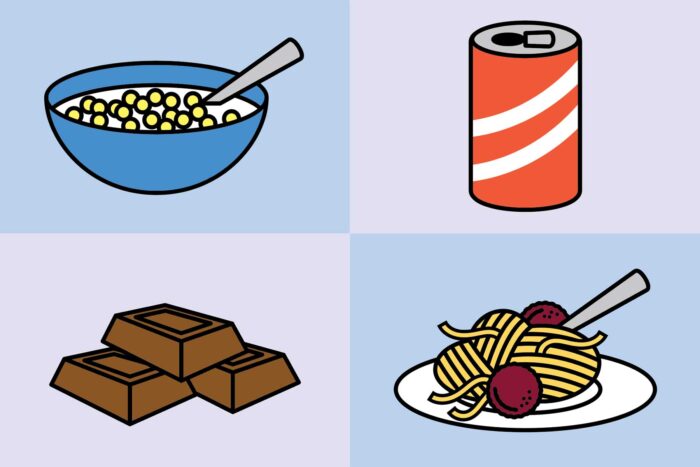Human gut microbes could make processed foods healthier
A specific microbe can break down a chemical common in manufactured foods
 Mike Worful
Mike WorfulA new study from Washington University School of Medicine in St. Louis suggests the gut microbiome has an impact on how the body breaks down processed foods, such as cereals, pastas, chocolate and soda. The new knowledge could help in the development of healthier, more nutritious processed foods.
A new study from Washington University School of Medicine in St. Louis sheds light on how human gut microbes break down processed foods — especially potentially harmful chemical changes often produced during modern food manufacturing processes.
Eating processed foods such as breads, cereals and sodas is associated with negative health effects, including insulin resistance and obesity.
Reporting Oct. 9 in the journal Cell Host & Microbe, scientists have identified a specific human gut bacterial strain that breaks down the chemical fructoselysine, and turns it into harmless byproducts. Fructoselysine is in a class of chemicals called Maillard Reaction Products, which are formed during food processing. Some of these chemicals have been linked to harmful health effects. These findings raise the prospect that it may be possible to use such knowledge of the gut microbiome to help develop healthier, more nutritious processed foods.
The study was conducted in mice that were raised under sterile conditions, given known collections of human gut microbes and fed diets containing processed food ingredients.
“This study gives us a deeper view of how components of our modern diets are metabolized by gut microbes, including the breakdown of components that may be unhealthy for us,” said Jeffrey I. Gordon, MD, the Dr. Robert J. Glaser Distinguished University Professor and director of the Edison Family Center for Genome Sciences & Systems Biology. “We now have a way to identify these human gut microbes and how they metabolize harmful food chemicals into innocuous byproducts.”
Human gut microbial communities see foods as collections of chemicals. Some of these chemical compounds have beneficial effects on the communities of microbes living in the gut as well as on human health. For example, Gordon’s past work has shown that the gut microbiome plays a vital role in a baby’s early development, with healthy gut microbes contributing to healthy growth, immune function, and bone and brain development. But modern food processing can generate chemicals that may be detrimental to health. Such chemicals have been associated with inflammation linked to diabetes and heart disease. The researchers are interested in understanding the complex interactions between human gut microbes and the chemicals that are commonly consumed as part of a typical American diet.
In the new study, the researchers showed that a specific bacterium called Collinsella intestinalis breaks down the chemical fructoselysine into components that are harmless.
“Fructoselysine is common in processed food, including ultra-pasteurized milk, pasta, chocolate and cereals,” said first author Ashley R. Wolf, PhD, a postdoctoral researcher in Gordon’s lab. “High amounts of fructoselysine and similar chemicals in the blood have been linked to diseases of aging, such as diabetes and atherosclerosis.”
When fed a diet containing high amounts of fructoselysine, mice harboring Collinsella intestinalis in their gut microbial communities showed an increase in the abundance of this bacteria as well as an increase in the gut microbial communities’ ability to break down fructoselysine into harmless byproducts.
“This specific bacterial strain thrives in these circumstances,” Gordon said. “And as it increases in abundance, fructoselysine is metabolized more efficiently.”
He added, “The new tools and knowledge gained from this initial study could be used to develop healthier, more nutritious foods as well as design potential strategies to identify and harness certain types of gut bacteria shown to process potentially harmful chemicals into innocuous ones. A corollary is that they may help us distinguish between consumers whose gut microbial communities are either vulnerable or resistant to the effects of certain products introduced during food processing.”
Emphasizing the complexity of this task, Gordon, Wolf and their colleagues also showed that close cousins of Collinsella intestinalis did not respond to fructoselysine in the same way. These bacterial cousins, whose genomes vary somewhat, do not thrive in a fructoselysine-rich environment. The researchers said future studies are required before scientists will be able to identify and harness the specific capacities of individual microbes to clean up the array of potentially deleterious chemicals produced during some types of modern food manufacturing.






